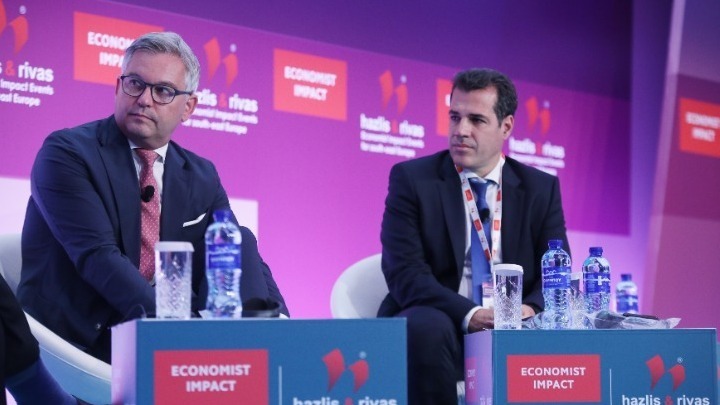ECONOMIST IMPACT - Brunner: 'The issue of returns is at the top of the European agenda'

The effectiveness of asylum, cooperation with third countries and coordination between member states on the distribution of migration flows are all issues of concern for EU member-state governments, European Commissioner for Internal Affairs and Migration Magnus Brunner and Migration and Asylum Minister Thanos Plevris said on Tuesday, during the 29th Economist Roundtable.
The European Commissioner underlined that migration and security are among the key issues facing the European Commission and said that Greece is doing a very good job on border security. He also spoke about distinguishing between illegal migration, asylum seekers and legal immigration, which is necessary, as Europe is aging and legal migrants are essential for the economy. "We must decide who comes to Europe, not the traffickers," stressed Brunner.
Referring to the Pact on Migration and Asylum, which is due to enter into force in 2026, he spoke about the discussions taking place regarding the revision of the returns regime, pointing out that one in five migrants in the European Union are there illegally and must return to their country.
Brunner said that the issue of returns is indeed at the top of the agenda and responded to a question about the return agreement with Libya by noting that the European Commission will have be having meetings with both governments in Libya next week. "We must first sort out our own affairs and then look at the external dimension in relation to migration," the Commissioner stated. "The Pact on Migration and Asylum is about the balance that we need in Europe and I think that Greece is moving in this direction and all member-states must work together," Brunner pointed out. He also referred to the option that member-states will have to create "return hubs" based on the Albanian model.
The Minister of Migration and Asylum, on his first day in his new position, stressed that with the prime minister's mandate, Greece is following a strict but fair migration policy. "Indeed, things that we have been saying since 2019 and were not a dominant position in Europe, are slowly starting to gain more supporters and are now essentially the dominant policy in Europe," Plevris emphasised.
He noted that a distinction must be made between asylum seekers based on international law, for whom it is necessary to expedite the asylum procedures, although there cannot be a mass granting of asylum, and those who enter illegally and whose asylum application is rejected. He stressed that the latter category must leave the country and argued that European policy must be made stricter. While Greece and other countries in the Mediterranean are trying to guard their borders, he pointed out, some still get through and enter illegally.
"If their application is rejected, these people actually suffer no penalties. They either stay in Greece or proceed to go to the rest of the EU countries. Therefore, it must be made clear that the person whose asylum application has been rejected, and who therefore has no need of international protection, will have two options: either that person must voluntarily return to their country or else face criminal sanctions. In other words, that person will have violated the Greek immigration law and therefore will know that they will be sentenced to prison," the minister pointed out, referring to the bill on illegal migration which is expected to be submitted to Parliament for a vote in the near future.
Addressing the commissioner, Plevris argued that Europe should enter a system of "central returns" and that there should be a reassessment of the benefits and allowances that migrants who have lost their right to asylum have.
The minister also said that "certainly migration through the legal process can provide solutions, but migration cannot be the solution to Europe's demographic problem or to Europe's labour problem," while he advocated for a rational framework for migration flows.
ANA-MPA is a COMMUNICATION SUPPORTER of the "29th Annual Government Roundtable - Walking steadily across a tightrope of uncertainty"
Photos from the conference:
On camera statements:
https://www.amna.gr/video-services/544358/Corporate%20Videos (YouTube)

